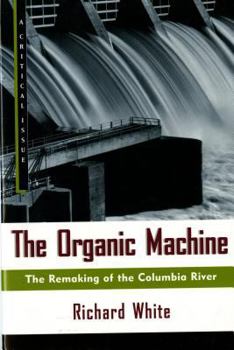The Organic Machine: The Remaking of the Columbia River
(Part of the Critical Issue Series)
Select Format
Select Condition 
Book Overview
The Hill and Wang Critical Issues Series: concise, affordable works on pivotal topics in American history, society, and politics.
In this pioneering study, White explores the relationship between the natural history of the Columbia River and the human history of the Pacific Northwest for both whites and Native Americans. He concentrates on what brings humans and the river together: not only the physical space of the region but also, and primarily, energy and work. For working with the river has been central to Pacific Northwesterners' competing ways of life. It is in this way that White comes to view the Columbia River as an organic machine--with conflicting human and natural claims--and to show that whatever separation exists between humans and nature exists to be crossed.Format:Paperback
Language:English
ISBN:0809015838
ISBN13:9780809015832
Release Date:January 1996
Publisher:Hill & Wang
Length:144 Pages
Weight:0.30 lbs.
Dimensions:0.5" x 5.4" x 8.2"
Customer Reviews
3 ratings
Brief and Brilliant
Published by Thriftbooks.com User , 17 years ago
The Organic Machine is an ideal example of what great scholarship should produce. It's a short, beautifully written, passionate history of what we human beings have made of the Columbia River in the time since white people came to the Northwest. It is driven by an environmentalism founded on the understanding that man is not separate from nature and never can be. The protagonist of this book is the salmon -- a creature to whom we have done no favors by transforming the Columbia -- yet man is not the villain of the piece. This book is written, as White says, "to understand rather than denounce." The profound depth of White's scholarship is made clear in the bibliographic essay that follows the text; the text itself makes use of massive learning in a graceful and accessible style. Anyone who cares about our relationship with the natural world, and who wants to think about it with some subtlety and historical grounding, should read this book. They don't come any better.
brilliant but dispassionate
Published by Thriftbooks.com User , 22 years ago
Richard White's "Organic Machine" is a neat display of erudition and intelligence. Through the prism of the Columbia river, the book delves into the difficult relations between native Americans and white settlers. It shows the stronghold an aluminum multinational on local economy and politics. It informs us about the megalomania of giant state bureaucracies. It analyses the emergence and subsequent (enormously expensive) blunders in managing nuclear reactors, followed by the immense human and economic costs. It explores the society's attitudes to endangered species such as salmon, threatened with extinction because of technical progress. It shows us the power and resilience of a large river, unwilling to yield to the numerous dams built during the last 100 years. The Organic Machine compares to John Barry's "Rising Tide", which treated the Mississippi's history as a classic epic in 400+ pages. "Rising Tide" is a compelling page-turner, not at all times sharp in its analysis, but centered around brilliantly narrated biographies and societal sketches. The Columbia's history has been just as rich, but Richard White took a totally different approach to explain the river. All elements which made Rising Tide such a fun read are there, and more. But Richard White chose to strip the story to the bone. What remains is 112 pages of crisp, flawless analysis. "Organic Machine" is very smart, but I thought the author was too dispassionate. Every page in this book screams for more illustrative anecdotes, it should have been at least three times its actual size.
The best environmental history book to date?
Published by Thriftbooks.com User , 24 years ago
Hands down the best history book written in English on a river. It rivals William Cronon's "Nature's Metropolis" as the best environmental history book I've read. Anyone who spends time near/on rivers (especially the Columbia) will appreciate this book. White tells a fascinating, compact story (~100 pages) that will force the consciencious reader to rethink his/her relationship with rivers as a source of energy. The book is also a lesson in form and style.






